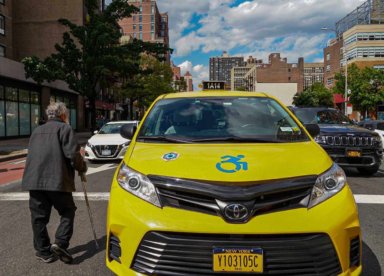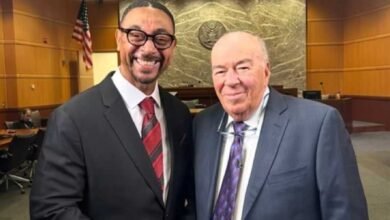Disability advocates say NYC failing to meet settlement agreement on accessible taxis

A group of disability advocates told a federal judge last week that New York City is failing to comply with a settlement reached a decade ago that called for half of yellow taxis to be accessible for people with disabilities.
More than a decade ago, in 2013, the city settled a class-action lawsuit and, in doing so, agreed that at least half of all yellow cabs on city streets would comply with the Americans With Disabilities Act by 2020. Less than 2% of taxis were accessible at the time.
The federal judge overseeing the case, George Daniels, said at the time the agreement was “one of the most significant acts of inclusion since Jackie Robinson joined the Brooklyn Dodgers.”
When 2020 hit, advocates returned to the negotiating table amenable to an extension due to the COVID-19 pandemic and the rise of Uber and Lyft in the intervening years. They agreed to extend the deadline to 2023.
Now, with that deadline passed, the advocates are petitioning Judge Daniels to compel the city’s compliance with the settlement, with well below half of the 13,000 medallion taxis accessible, barely any Ubers and Lyfts accessible, and the city seemingly signaling it wants out of the settlement obligations.
“One hundred percent of the yellow taxis should be accessible,” said Dan Brown, a lawyer with Sheppard Mullin representing the plaintiffs. “The fact that less than 50% are accessible, despite our written agreement, is inexcusable.”
Less than a third of medallion taxis in active service were ADA-accessible as of the last settlement compliance report, the plaintiffs note. When including unused but still on-the-books medallions, the number rises to 42%.
In the complaint, the plaintiffs say they met with Adams administration representatives in January to discuss a motion the city intended to file “to be relieved from the requirements of the settlement agreement.” By the end of the meeting, they say the “defendants had clearly indicated their intent to be free from any obligation to make the City’s taxis accessible.”
“Plaintiffs were shocked and disappointed by Defendants’ letter and about-face on their commitments to accessibility,” reads the motion.
A TLC spokesperson did not respond to a request for comment.
The plaintiffs requested that the court issue an order compelling the TLC to follow the stipulations of the settlement.
What accessible cabs have come to market have had a significant impact on the lives of disabled New Yorkers, allowing more freedom of movement than they can get via Access-a-Ride.
“Yellow taxis should not be a thing of the past for us,” said Jean Ryan, president of Disabled in Action and a wheelchair user. “Wheelchair users who are residents, visitors, and tourists need to hail and use wheelchair-accessible cabs to get around our city. This is about equity and fairness.”




